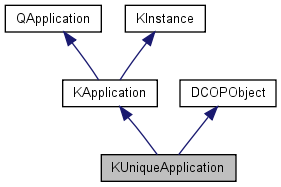KDECore
KUniqueApplication Class Reference
Maintains only a single instance of a running application at a time. More...
#include <kuniqueapplication.h>

Public Member Functions | |
| KUniqueApplication (bool allowStyles=true, bool GUIenabled=true, bool configUnique=false) | |
| virtual int | newInstance () |
| bool | process (const QCString &fun, const QByteArray &data, QCString &replyType, QByteArray &replyData) |
| bool | restoringSession () |
| virtual | ~KUniqueApplication () |
Static Public Member Functions | |
| static void | addCmdLineOptions () |
| static void | setHandleAutoStarted () |
| static bool | start () |
Protected Member Functions | |
| virtual void | virtual_hook (int id, void *data) |
Detailed Description
Maintains only a single instance of a running application at a time.If another instance is started, it will determine (via DCOP) whether it is the first instance or a second instance. If it is a second instance, it will forward on the information to the first instance and then quit.
The .desktop file for the application should state X-DCOP-ServiceType=Unique, see kapplication.h
If your application is used to open files, it should also support the --tempfile option (see KCmdLineArgs::addTempFileOption()), to delete tempfiles after use. Add X-KDE-HasTempFileOption=true to the .desktop file to indicate this.
- See also:
- KApplication DCOPObject
Definition at line 48 of file kuniqueapplication.h.
Constructor & Destructor Documentation
| KUniqueApplication::KUniqueApplication | ( | bool | allowStyles = true, |
|
| bool | GUIenabled = true, |
|||
| bool | configUnique = false | |||
| ) |
Constructor.
Takes command line arguments from KCmdLineArgs
- Parameters:
-
allowStyles Set to false to disable the loading on plugin based styles. This is only useful to applications that do not display a GUI normally. If you do create an application with allowStylesset to false it normally runs in the background but under special circumstances displays widgets. Call KApplication::enableStyles() before displaying any widgets.GUIenabled Set to false to disable all GUI stuff. This implies no styles either. configUnique If true, the uniqueness of the application will depend on the value of the "MultipleInstances" key in the "KDE" group of the application config file.
Definition at line 317 of file kuniqueapplication.cpp.
| KUniqueApplication::~KUniqueApplication | ( | ) | [virtual] |
Member Function Documentation
| void KUniqueApplication::addCmdLineOptions | ( | ) | [static] |
Adds command line options specific for KUniqueApplication.
Should be called before calling KUniqueApplication constructor and / or start().
Reimplemented from KApplication.
Definition at line 87 of file kuniqueapplication.cpp.
| int KUniqueApplication::newInstance | ( | ) | [virtual] |
Creates a new "instance" of the application.
Usually this will involve making some calls into the GUI portion of your application asking for a new window to be created, possibly with some data already loaded based on the arguments received.
Command line arguments have been passed to KCmdLineArgs before this function is called and can be checked in the usual way.
The default implementation ensures the mainwindow of the already running instance is shown and activated if necessary. You should prefer using it from your overridden method instead of doing it directly.
Note that newInstance() is called also in the first started application process.
- Returns:
- An exit value. The calling process will exit with this value.
Definition at line 466 of file kuniqueapplication.cpp.
| bool KUniqueApplication::process | ( | const QCString & | fun, | |
| const QByteArray & | data, | |||
| QCString & | replyType, | |||
| QByteArray & | replyData | |||
| ) |
Dispatches any incoming DCOP message for a new instance.
If it is not a request for a new instance, return false. Overloaded from DCOPObject to make sure that the application stays unique.
- Parameters:
-
fun DCOP function signature data the data for the arguments replyType the type of the reply value replyData the reply
- See also:
- DCOPObject
Definition at line 393 of file kuniqueapplication.cpp.
| bool KUniqueApplication::restoringSession | ( | ) |
Returns whether newInstance() is being called while session restoration is in progress.
- Since:
- KDE 3.3
Definition at line 461 of file kuniqueapplication.cpp.
| void KUniqueApplication::setHandleAutoStarted | ( | ) | [static] |
| bool KUniqueApplication::start | ( | ) | [static] |
Forks and registers with dcop.
The command line arguments are being sent via DCOP to newInstance() and will be received once the application enters the event loop.
Typically this is used like:
int main(int argc, char **argv) { KAboutData about("myappname", "myAppName", .....); KCmdLineArgs::init(argc, argv, &about); KCmdLineArgs::addCmdLineOptions( myCmdOptions ); KUniqueApplication::addCmdLineOptions(); if (!KUniqueApplication::start()) { fprintf(stderr, "myAppName is already running!\n"); exit(0); } KUniqueApplication a; a.exec(); }
- Returns:
- true if registration is successful. false if another process was already running.
Definition at line 93 of file kuniqueapplication.cpp.
| void KUniqueApplication::virtual_hook | ( | int | id, | |
| void * | data | |||
| ) | [protected, virtual] |
The documentation for this class was generated from the following files:
 KDE 3.5 API Reference
KDE 3.5 API Reference